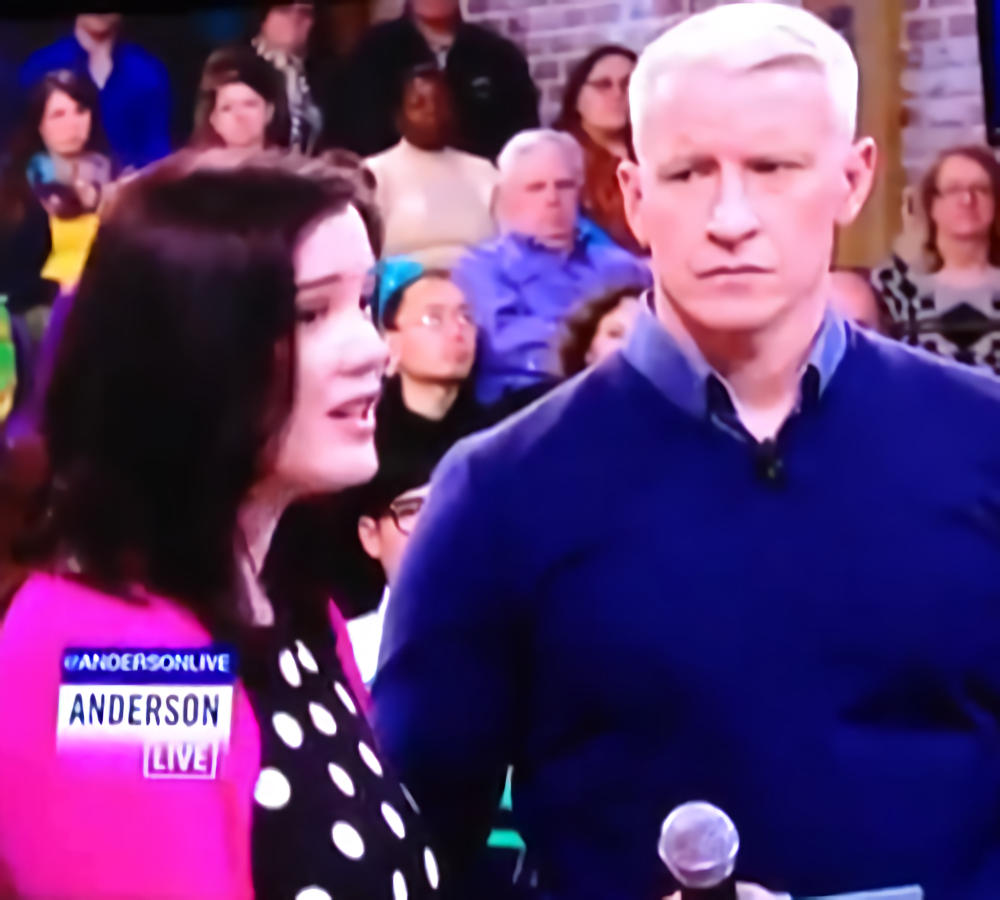This post started with a phone call from a television producer.
“We’re doing a show about ‘Moms on Medication,’ and we got your name as someone who might be interested in being a part of the discussion.”
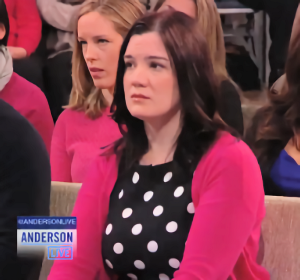
I was forwarded a link to Xanax ‘helps me be a better mom’ by Shawn Bean for CNN/Parenting.com – and the comments section infuriated me.
I have been very open and honest about my struggles with clinical depression and anxiety – both of which are co-morbid with my autism diagnosis. I’ve written about how I can trace my mental health issues back to 9/11, and Trey Pennington’s suicide made me brutally honest about what my worst depressive episodes feel like.
And, appropriately enough, I published a post just last week about self-medicating. I’ve tweeted and commented all over the internet about the prescription drugs I take: Effexor XR, Trazodone, and Ativan. Two antidepressants and an anti-anxiety medication. And some people dare to call my pills a crutch.
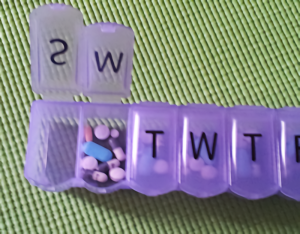
You know, it must be nice to be able to pull through “depression” with five minutes of deep breathing in the laundry room. The thing about depression is not the generic “two-week period [of] fatigue and decreased energy, feelings of pessimism, overeating or appetite loss, insomnia or early-morning wakefulness, loss of interest in hobbies and activities once found pleasurable, and irritability and restlessness.” To be diagnosed with clinical depression, not only do all of these symptoms have to be present, but they must persist for longer than 2 months or are characterized by marked functional impairment, morbid preoccupation with worthlessness, suicidal ideation, psychotic symptoms, or psychomotor retardation.
Marked functional impairment.
If a quick breather in the laundry room does the trick for you, you are not functionally impaired. When you start retiring to your bedroom to ward off a “meltdown,” but end up sobbing in the fetal position, inconsolable, for the next 20+ minutes, so that you have to apologize to your child and reassure him that it’s not his fault you’re upset – then we’ll talk. Especially if you do this several times a week. Or when you’ve been so despondent you haven’t been able to make yourself eat in days, and your husband literally puts food in your mouth and makes you chew, then physically places your feet on the floor and pulls you up by both arms to get you up from the position you’ve been in for half the day.
So sure. Is depression getting over-diagnosed? Possibly. Are people getting prescribed drugs they don’t necessarily need because of it? Of course. Does this mean that prescription drugs are always the wrong choice for treating mental illness? Hell no.
Mental illness is not a character flaw.
I am not “using meds to deal with the emotional roller coaster of parenthood.” The chemicals in my brain are severely imbalanced. You know how I know this? For one thing, I have a Master’s degree in Psychology, and I’ve studied psychopharmacology. Not sociology, like the Rutgers professor who made this ridiculous statement. For another thing, my depressive episodes are not necessarily triggered by any external force. Most of the time, I do get depressed because of something that happens. But other times, depression just happens to me when everything in my life is otherwise fine. When your world gets turned upside down, and you find yourself in a pit of despair for no apparent reason, and it feels like you’ll never be able to claw your way out, you’ll probably begin to resent anyone who suggests you just “get over it.”
And then there’s anxiety. Anti-anxiety drugs, like the Ativan I take, are commonly abused prescriptions. So of course, anyone who’s never needed to take them will demonize them.
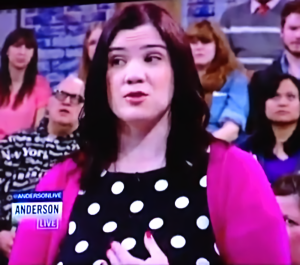
Have you ever had a panic attack? You wouldn’t forget it, if you had. In fact, panic attacks are often mistaken for heart attacks. I was first prescribed Xanax for my panic attacks, but I couldn’t tolerate the way it made me feel – groggy and sluggish for hours. I almost missed a wedding reception because I had a panic attack after the wedding, needed a Xanax, and proceeded to fall asleep at the hotel. I never took Xanax again. I take Ativan instead, although I still don’t like the way it makes me feel. It does stop all the physical symptoms of my acute anxiety, but it does affect my cognitive functioning. I know I can’t drive for 6 hours after taking Ativan. I honestly can’t understand why anyone would choose to abuse a drug like this, because I find the side effects unpleasant. But when weighed against the very real possibility of suffering heart attack-like symptoms for hours [as I have done before when Ativan was not an option] – I take the pill. It’s my own private risk/benefit analysis.
People who suffer from untreated mental illness are not “better,” nor are they doing themselves any favors.
Untreated depression can lead to suicide, if you happen to have those suicidal feelings. (Thank God, I’ve never been suicidal.) So at the worst end of the spectrum, you have death. Immediate, self-inflicted death. But further on up the continuum isn’t a pretty picture either. Untreated depression can lead to an increased risk of diabetes, heart disease, and stroke. Alcohol and drug abuse are also common forms of self-medication, which is still a form of treatment, though not under the care of a doctor, and certainly not recommended. Reckless behavior, violent outbursts, headaches, digestive disorders, and chronic pain can also be a problem with untreated depression. Pregnant women with untreated depression have an increased risk of miscarriage, premature birth, hypertension and preeclampsia, and a host of other negative outcomes. Oh, and then there’s all of your relationships – family, friends, work… there’s a helpful list of child developmental problems and other issues related to moms with untreated postpartum depression, also know as PPD.
Like with depression, untreated anxiety can lead to “chronic physical diseases, such as diabetes and congestive heart failure.” Harvard Medical School includes chronic physical illnesses such as irritable bowel syndrome and heart disease as risks. And substance abuse, of course. Lost work hours due to trips to the emergency room for panic attacks that are mistaken for something more serious. “Possible health problems include insomnia; digestive or bowel problems; and damage to the kidneys, blood vessels and heart, notes the Mayo Clinic.” Extended release of cortisol, the stress hormone, can have permanent negative effects on memory, as well. As for pregnant women with untreated anxiety, I have to quote a larger section of text from the Expert Review of Obstetrics & Gynecology for the full effect:
Sustained cortisol elevation may also account for the adverse effects of antenatal maternal depression and anxiety on obstetric complications and on offspring, a phenomenon known as ‘fetal programming’. Infants of depressed mothers tend to show more inconsolability and excessive crying. Children of women who experienced antenatal depression are more prone to negative emotions and behavioral problems. Similarly, sustained high levels of maternal anxiety during the third trimester of pregnancy significantly predict anxiety, sleep disturbance and other emotional problems in children.
Postpartum anxiety and/or depression may interfere with maternal self-care and mother–infant bonding, increasing the risk of infant neglect. In addition, compared with nondepressed mothers, depressed mothers have decreased breastfeeding duration and self-efficacy, and more breastfeeding difficulties.
What that passage there says is that a pregnant woman with untreated mental illness is tossing the dice with her child’s future. (I’m sorry, my child; I didn’t know this when I was pregnant with you.)
Still sound like hocus pocus to you? A German researcher found measurable differences in the brains of people with untreated mental illnesses, abnormalities in the dorsomedial prefrontal cortex, anterior cingulate, hippocampus, dorsolateral prefrontal cortex, and orbitofrontal cortex as compared to the brains of people without mental illness. Another doctor reviewing the research concluded that, “treatment [of mental illness] can protect from ongoing brain injury…an early start of treatment with antidepressants and psychotherapy may prevent neuroplastic changes that, in turn, worsen the clinical course.”
Mental illness has a biological basis.
You know what else has a biological basis? Cancer. Would you tell a mother with cancer not to put that poison in her veins (because that’s exactly what chemotherapy is) because she just needs to “suck it up” and be a mom to her kids? No. That would be ridiculous. Cancer isn’t generally known for curing itself. Neither is mental illness. You wouldn’t dream of telling a diabetic mom not to take her insulin, right? My psychiatric medications make it possible for me to function on a daily basis, so I can be there for my son. My pills allow me to talk through my problems with my psychiatrist in an effort to improve my coping skills, and hopefully to find out why I am the way I am, to one day re-route the pathways in my brain to react in a healthier manner they do today.
If you have never struggled with mental illness, do not deign to pass judgment on those who struggle with it every day. Your idea of being “depressed” is vastly different than mine. Your idea of being “anxious” is very different from mine, too. If you can handle your own mood issues without medication, then that is great for you. I’m actually kind of jealous. But I am not you. You think prescription drugs are the devil; the science has shown that lack of treatment can be even more deadly. There is a risk in everything we do…or don’t do.
You can still judge me, I guess, but you cannot shame me.
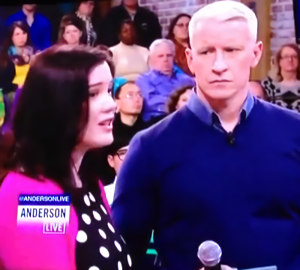
There is a stigma attached to mental illness, but it is undeserved. Do you blame a man for his lymphoma when he goes for chemo? Do you blame a woman for her lymphangioleiomyomatosis (LAM), a progressive lung disease, while she waits for her double lung transplant? They are not weak of character or seeking medical treatment, and neither am I. I am stronger for taking the necessary steps for positive change in my life. It is my illness that makes me feel weak for it, and the unforgiving judgment of people who have no idea what they are talking about reinforces that feeling.
I am not just a better mom for trying to take control of my mental illness; I am a better wife, a better business owner. A better person. I am taking control of my health.
This is why I, Christina Gleason, was on Anderson Live this morning. To stand up against the stigma. Follow the hashtag #ALParenting to join in the discussion.
Update: One of the other moms on the show today asked me if I would just throw pills at my kid because I use pills. I said no, absolutely not. We talk about coping skills all the time – deep breaths, taking a timeout in your room, that sort of thing. And they really don’t see me taking pills. My maintenance meds, I take at bedtime. When I need an Ativan to pre-bedtime anxiety, I will try to do it surreptitiously so they don’t see Mommy taking pills. I also don’t drink alcohol before they go to bed, because they don’t need to see me when I’m tipsy. I don’t swill booze or toss pills into my mouth indiscriminately. If other coping skills aren’t cutting it, nothing but that Ativan is going to stop the physical anxiety reaction I’m experiencing.
